Intensified fighting in eastern Aleppo starting in July 2016 resulted in thousands of people injured and killed, and has deprived the civilian population of essential services, including health care. In September 2016, the humanitarian community began negotiations with parties to the conflict to obtain approval for a medical evacuation and assistance plan that would allow the delivery of medicines into the city and the evacuation of civilians.
WHO developed a full package of operational documents for medical evacuation, including the detailed concept of operations and agreements with local NGO partners. Essential medical supplies, including life-saving medicines, were prepositioned in health facilities on possible routes of evacuation. Stand-by agreements for ambulance transportation were finalized with local NGO partners to enable medical evacuation.
Negotiations with parties to the conflict continued for 3 months, with many setbacks due to lack of security guarantees or lack of access grants. Finally, on 13 December, the plan to evacuate civilians from east Aleppo was announced. The first evacuations of civilians from besieged neighbourhoods in eastern Aleppo took place 15 December.
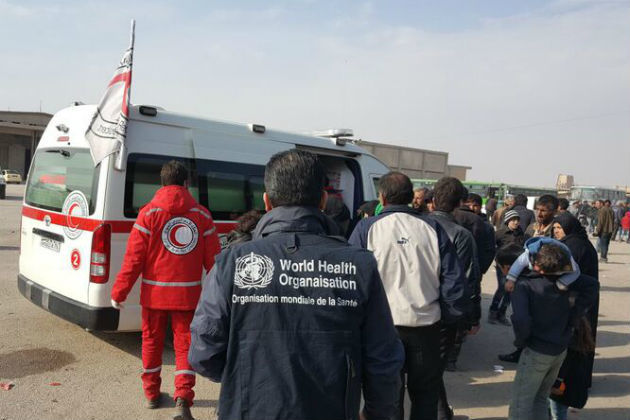
Ambulances were staged at the transfer point and waited to receive evacuees from eastern Aleppo.
Syria Health Cluster
One health worker recounts his experience: “The day after we heard that the evacuations would proceed, we arrived at around 05:00 in the morning at the transfer point, or zero point as we called it, to meet the patients who were going to be evacuated and referred to health facilities. All teams were on the ground and hospitals were ready to receive patients. Ambulances were ready at zero point and more were stationed on the evacuation route from eastern Aleppo to Gaziantep. We waited for the first patients to arrive, but no one came.
Ten hours later, at 15:00 in the afternoon, we were told that the first convoy was on its way. When I saw the first ambulance arrive, I started crying. I was not the only one –I noticed other colleagues hiding their tears. It was an unbelievable feeling of relief that this was finally happening. We had been waiting for this moment for the past 3 months. All of our plans were for this moment to happen.”
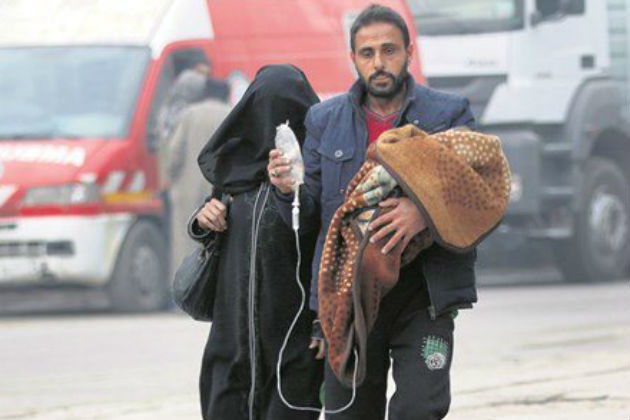
A family from eastern Aleppo arrived at the transfer point, where their baby was provided with medical care before being transported to a hospital in western Aleppo.
World Vision
From 15–23 December more than 36 086 people, including men, women, children, the disabled, and the elderly, were successfully evacuated from eastern Aleppo. UN teams were present to observe and monitor the evacuations. An additional 80 158 people were internally displaced to government-controlled areas in and around Aleppo city.
WHO supported the implementation of the medical evacuation plan of critically ill and injured residents and accompanying family members from eastern Aleppo.
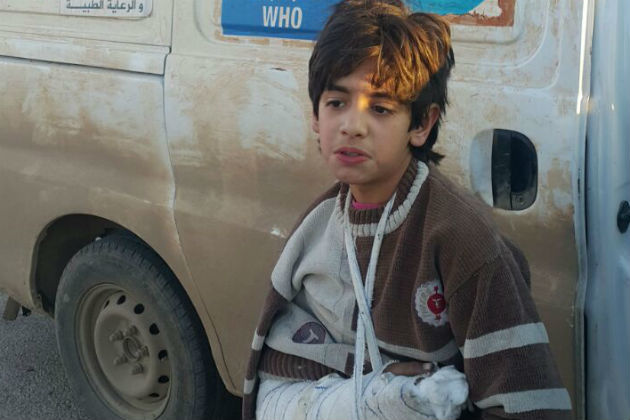
This young boy arrived at the transfer point with a broken arm and waited to be reunited with his parents, who were being transported in a separate ambulance.
Turkey Health Cluster
A health worker recalls: “In one of the ambulances arriving to zero point, I saw a child crying. He looked very confused. He kept asking me where he was and if he had arrived. His parents were on another bus and he had faced the long journey alone with a broken arm. Thankfully, one of the medical staff reunited him with his family. I will never forget his face when he first arrived, looking lost and alone. I am sure he will never forget this experience, too.”
WHO and Turkey health cluster partners mobilized more than 156 ambulances for patient transportation and medical triage was established at collection points in western rural Aleppo.
In total, 811 patients were referred to hospitals in west Aleppo and Idleb, including 100 women and almost 150 children. Of those, nearly 100 patients requiring specialized care were transported to hospitals in Turkey. The other patients were referred to 8 hospitals in western rural Aleppo and Idleb.
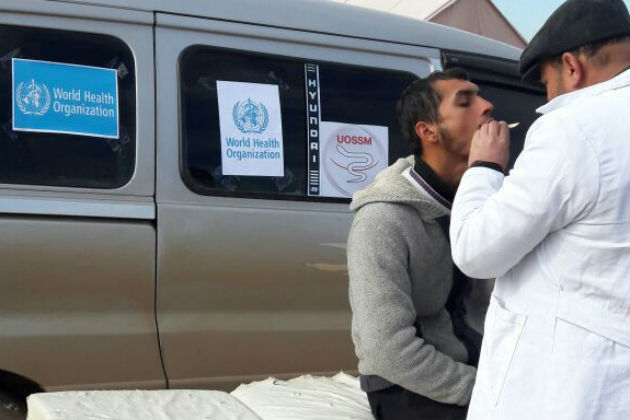
At one of the mobile medical clinics, a doctor examined a patient from eastern Aleppo.
Turkey Health Cluster
Essential primary health care services, mental health screening and treatment, nutrition screening and referral in areas along the evacuation route were provided by 26 mobile teams. In total, more than 8836 consultations were performed.
Hospitals in western rural Aleppo and Idleb receiving injured patients were given additional medicines and supplies, including Interagency Emergency Health Kits for more than 300 000 treatments and trauma and surgical supply kits for more than 1500 patients.
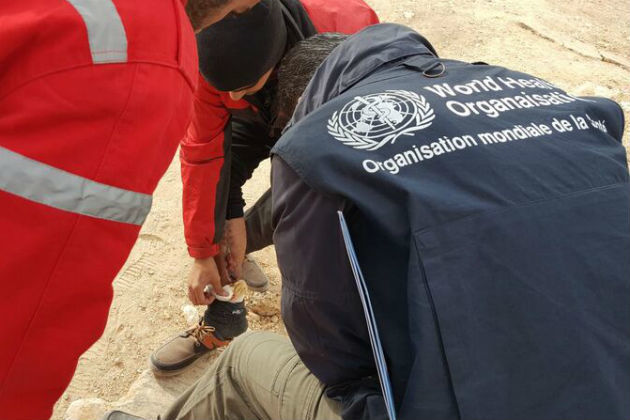
WHO and Syrian Arab Red Crescent staff examine an injured patient at the transfer point.
: Syria Health Cluster
From inside Syria, 1315 cases of critically ill and injured persons from eastern Aleppo were escorted by the Syrian Arab Red Crescent (SARC) and the International Committee of the Red Cross (ICRC) and referred to 5 public hospitals in western Aleppo for follow-up and higher level care.
Primary Health Care services (paediatric, internal and maternal) were made available through 7 mobile clinics and 12 mobile teams. Reproductive health services and qualified mental health and psychosocial counselling services were also supported through mobile clinics. In total, 15 115 consultations were provided by WHO-supported health care workers.
WHO and health sector partners also provided assistance to 11 public hospitals and 23 primary health clinics in Aleppo city. Life-saving medical supplies for 300 000 treatment courses were dispatched, in addition to the average monthly delivery of 60 standards health kits to health partners in Aleppo, which meet the primary care needs of 60 000 people.
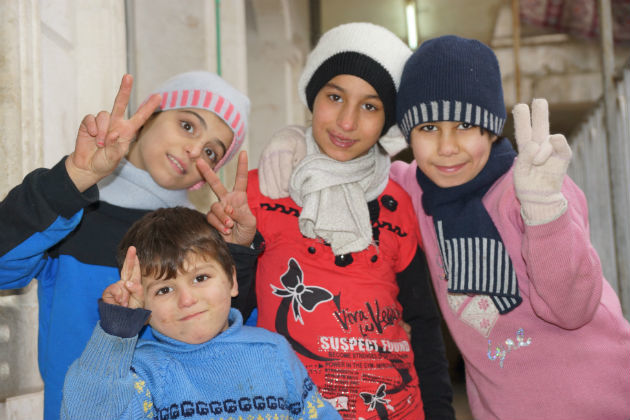
Children in eastern Aleppo were happy to be together after being evacuated.
Syria Health Cluster
“Despite the operational and political challenges, as we planned for the evacuations, the progress made was remarkable and reflects the professionalism and dedication of our teams. This was yet another example of solidarity and outstanding commitment to the humanitarian cause,” said Dr Pavel Ursu, WHO Representative in Turkey.
“We consider the evacuations a landmark achievement within the context of this tragic crisis. And it was made possible through the strong coordination and collaboration of all partners on the ground who worked tirelessly under extremely challenging conditions, with almost no sleep, standing for days in the rain and snow to help the people of eastern Aleppo,” said Ms Elizabeth Hoff, WHO Representative in Syria.